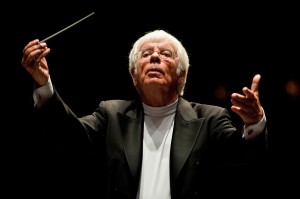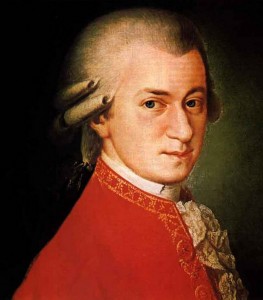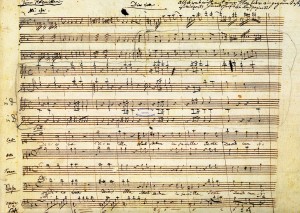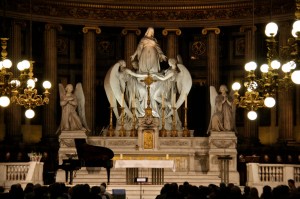IN PRAISE OF MOZART’S REQUIEM
I’ll never forget the first time I heard Mozart’s Requiem. I was wandering through the streets of Paris on a warm summer evening and I happened to stop at the magnificent Madeleine Church on the Place de la Concorde. Inside was a full orchestra with choir and soloists rehearsing the Requiem. I didn’t mind paying to return on the weekend for the actual performance. Although the church somewhat post-dates Mozart’s final composition, its neo-classical architecture formed the perfect backdrop. I’ve heard other performances since then, but none have yet compared to that seminal experience.
 The Los Angeles Chamber Orchestra (LACO), under the direction of guest conductor Helmuth Rilling, will perform Mozart’s Requiem for two performances only on January 26 at the Alex Theatre and January 27 at Royce Hall. They will be joined by soprano Stacey Tappan, alto Callista Hoffman, tenor Nicholas Phan, bass Michael Dean and USC’s Thornton Chamber Singers and soloists (Jo Michael Scheibe, music director). Concert-goers are invited to attend pre-performance talks one hour before curtain that will provide insight into the music and musicians. The all-Mozart program, which celebrates the composer’s 257th birthday, opens with his Symphony No. 39 in E-flat major, K. 543.
The Los Angeles Chamber Orchestra (LACO), under the direction of guest conductor Helmuth Rilling, will perform Mozart’s Requiem for two performances only on January 26 at the Alex Theatre and January 27 at Royce Hall. They will be joined by soprano Stacey Tappan, alto Callista Hoffman, tenor Nicholas Phan, bass Michael Dean and USC’s Thornton Chamber Singers and soloists (Jo Michael Scheibe, music director). Concert-goers are invited to attend pre-performance talks one hour before curtain that will provide insight into the music and musicians. The all-Mozart program, which celebrates the composer’s 257th birthday, opens with his Symphony No. 39 in E-flat major, K. 543.
 Although some might disagree, it seems to me that Mozart’s Requiem (1791) is largely responsible for the continuing popularity of the Requiem as a musical form up to the present. Despite a number of Requiem settings written during the Renaissance, most notably that composed by Tomas Luis de Victoria in 1603 for the death of the Dowager Empress Maria of Spain, none of note were written in the intervening period. Many notable Requiem settings, however, were written afterward, in the nineteenth and twentieth centuries by such composers as Berlioz, Brahms, Britten, Durufle, Dvorak, Faure, Rutter and Verdi. While some of these I have sung myself (as a member of the chorus, not as a soloist), it is Mozart’s setting that remains my favorite.
Although some might disagree, it seems to me that Mozart’s Requiem (1791) is largely responsible for the continuing popularity of the Requiem as a musical form up to the present. Despite a number of Requiem settings written during the Renaissance, most notably that composed by Tomas Luis de Victoria in 1603 for the death of the Dowager Empress Maria of Spain, none of note were written in the intervening period. Many notable Requiem settings, however, were written afterward, in the nineteenth and twentieth centuries by such composers as Berlioz, Brahms, Britten, Durufle, Dvorak, Faure, Rutter and Verdi. While some of these I have sung myself (as a member of the chorus, not as a soloist), it is Mozart’s setting that remains my favorite.
 Part of the appeal of Mozart’s Requiem, at least to me, lies in its use of a minor key, D minor, which gives it a more melancholy tonality. And then there are the many mysteries surrounding the piece’s composition, which were explored in the film Amadeus (1984). Mozart was writing his Requiem right up until his death in 1791, making it his last composition, almost a final testament. Yet, because of its unfinished nature, the piece is most emotional and powerful at the beginning, from the stirring Dies irae to the stately Rex tremendae maiestatis. Unlike the beatific ending of Faure’s Requiem, Mozart’s slowly fizzles out. Whether that is because or despite the fact that others have finished the piece may never be known. I’m curious to discover which of the many modern completions of the Requiem the Los Angeles Chamber Orchestra will perform.
Part of the appeal of Mozart’s Requiem, at least to me, lies in its use of a minor key, D minor, which gives it a more melancholy tonality. And then there are the many mysteries surrounding the piece’s composition, which were explored in the film Amadeus (1984). Mozart was writing his Requiem right up until his death in 1791, making it his last composition, almost a final testament. Yet, because of its unfinished nature, the piece is most emotional and powerful at the beginning, from the stirring Dies irae to the stately Rex tremendae maiestatis. Unlike the beatific ending of Faure’s Requiem, Mozart’s slowly fizzles out. Whether that is because or despite the fact that others have finished the piece may never be known. I’m curious to discover which of the many modern completions of the Requiem the Los Angeles Chamber Orchestra will perform.
 In our increasingly secular age, it might be worthwhile giving some background on what a Requiem actually is. Put simply, a Requiem is a particular form of the Mass, used in the Catholic Church to commemorate the dead, typically on All Souls’ Day (November 2), at a funeral or on the anniversary of someone’s death. The word requiem is Latin means rest. (The initials RIP on a tombstone stand for requiescat in pace, rest in peace.) The first portion of the Requiem Mass typically begins with the words Requiem aeternam, giving the name of Requiem to this musical form. In addition to the Kyrie, Sanctus and Agnus Dei (found in ordinary Mass settings), Requiems can have other unique parts, which vary from composer to composer. Mozart’s Requiem includes most of the traditional liturgical texts, except for the Pie Jesu. Despite the existence of numerous competing Requiem settings, Mozart’s remains in wide currency and was performed nearly fifty years ago in memory of President John F. Kennedy on January 19, 1964.
In our increasingly secular age, it might be worthwhile giving some background on what a Requiem actually is. Put simply, a Requiem is a particular form of the Mass, used in the Catholic Church to commemorate the dead, typically on All Souls’ Day (November 2), at a funeral or on the anniversary of someone’s death. The word requiem is Latin means rest. (The initials RIP on a tombstone stand for requiescat in pace, rest in peace.) The first portion of the Requiem Mass typically begins with the words Requiem aeternam, giving the name of Requiem to this musical form. In addition to the Kyrie, Sanctus and Agnus Dei (found in ordinary Mass settings), Requiems can have other unique parts, which vary from composer to composer. Mozart’s Requiem includes most of the traditional liturgical texts, except for the Pie Jesu. Despite the existence of numerous competing Requiem settings, Mozart’s remains in wide currency and was performed nearly fifty years ago in memory of President John F. Kennedy on January 19, 1964.
Los Angeles Chamber Orchestra
Mozart / Requiem & Symphony No. 39
January 26, 2013 at 8 p.m. (Alex Theatre in Glendale)
January 27, 2013 at 7 p.m. (UCLA’s Royce Hall in Westwood)
$25-$110
($10 student rush tickets may be available for purchase before the concert)
for tickets, call (213) 622-7001 ext. 1 or visit http://www.laco.org
